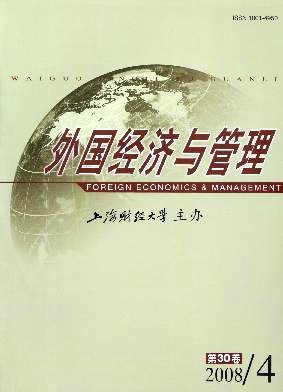家族企业特征对其国际化进程的影响——基于组织学习视角的探讨
外国经济与管理 2008 年 第 30 卷第 04 期, 页码:39 - 46
摘要
参考文献
摘要
随着经济全球化程度的不断提高,越来越多的家族企业开始谋求国际化发展。家族企业的固有特征在很大程度上束缚了它们的国际化步伐。本研究从组织学习的视角来探讨家族企业特征对其国际化进程的影响,并针对我国家族企业的实际情况提出了若干建议。
[1]Bengtsson,L.Explaining born globals:An organizational learning perspective on the internationalization process[J].Globalizationand Small Business,2004,1(1):28-41.
[2]阎海峰,关涛.基于组织学习视角的跨国公司行为新解[J].外国经济与管理,2006,28(10):34-42.
[3]Knight,G,and Liesch,P.Information internalization in internationalizing the firm[J].Journal of Business Research,2002,55(12):981-995.
[4]Rugman,A M.Research and development by multinational and domestic firms in Canada[J].Canadian Public Policy,1981,7(4):604-616.
[5]Eriksson,K,Johanson,J,Majkgard,A,and Deo Sharma,D.Effect of variation in knowledge accumulation in the internationaliza-tion process[J].International Studies of Management&Organization,2000,30(1):26-44.
[6]Basly,S.The internationalization of family SME:An organizational learning and knowledge development perspective[J].Baltic Jour-nal of Management,2007,2(2):154-161.
[7]Miller,D,Steier,L,and Le Breton-Miller,I.Lost in time:Intergenerational succession,change,and failure in family business[J].Journal of Business Venturing,2003,18:513-531.
[8]Mustakallio M,and Autio,E.Optimal governance in family firms[R].Babson Entrepreneurship Conference,2001.
[9]Ranft,A,and O’eill,H.Board composition and high-flying founders:Hints of trouble to come?[J].The Academy of ManagementExecutive,2001,15(1):126-139.
[10]Salvato,C,Williams,M,and Habbershon,T.Values and competitive advantage:The cultural determinants of dynamic capabilitiesin family firms[R].The 13th FBN Conference,Helsinki,2002.
[11]King,S,Solomon,G,and Fernald,L J.Issues in growing a family business:A strategic human resource model[J].Journal ofSmall Business Management,2001,39(1):3-13.
[12]Schulze,W,Lubatkin,M,and Dino,R.Exploring the agency consequences of ownership dispersion among the directors of privatefamily firms[J].Academy of Management Journal,2003,46(2):179-194.
[13]Schulze,W,Lubatkin,M,Dino,R,and Buchholtz,A.Agency relationships in family firms:Theory and evidence[J].OrganizationScience,2001,12(2):99-116.
[14]严奇峰.台湾传统家族企业极端共存组织现象之探讨———系统稳态观点[J].管理评论(台湾),1994,13(1):1-22.
[15]Yli-Renko,H,Autio,E,and Tontti,V.Social capital,knowledge,and the international growth of technology-based new firms[J].International Business Review,2002,11:279-304.
[16]Dibben,M,and Harris,S.Social relationships as a precursor to international business exchange[R].the 17th IMP Conference,Oslo,2001.
[17]Johanson,J,and Vahlne,J-E.The internationalization process of the firm:A model of knowledge development and increasing foreignmarket commitments[J].Journal of International Business Studies,1977,18(1):23-32.
[18]Okoroafo,S C.Internationalization of family businesses:Evidence from northwest Ohio,USA[J].Family Business Review,1999,12(2):147-158.
[19]Gallo,M,Arino,A,Manez,I,and Cappuyns,K.Internationalization via strategic alliances in family businesses[R].the 13th FBNConference,Helsinki,2002.
[2]阎海峰,关涛.基于组织学习视角的跨国公司行为新解[J].外国经济与管理,2006,28(10):34-42.
[3]Knight,G,and Liesch,P.Information internalization in internationalizing the firm[J].Journal of Business Research,2002,55(12):981-995.
[4]Rugman,A M.Research and development by multinational and domestic firms in Canada[J].Canadian Public Policy,1981,7(4):604-616.
[5]Eriksson,K,Johanson,J,Majkgard,A,and Deo Sharma,D.Effect of variation in knowledge accumulation in the internationaliza-tion process[J].International Studies of Management&Organization,2000,30(1):26-44.
[6]Basly,S.The internationalization of family SME:An organizational learning and knowledge development perspective[J].Baltic Jour-nal of Management,2007,2(2):154-161.
[7]Miller,D,Steier,L,and Le Breton-Miller,I.Lost in time:Intergenerational succession,change,and failure in family business[J].Journal of Business Venturing,2003,18:513-531.
[8]Mustakallio M,and Autio,E.Optimal governance in family firms[R].Babson Entrepreneurship Conference,2001.
[9]Ranft,A,and O’eill,H.Board composition and high-flying founders:Hints of trouble to come?[J].The Academy of ManagementExecutive,2001,15(1):126-139.
[10]Salvato,C,Williams,M,and Habbershon,T.Values and competitive advantage:The cultural determinants of dynamic capabilitiesin family firms[R].The 13th FBN Conference,Helsinki,2002.
[11]King,S,Solomon,G,and Fernald,L J.Issues in growing a family business:A strategic human resource model[J].Journal ofSmall Business Management,2001,39(1):3-13.
[12]Schulze,W,Lubatkin,M,and Dino,R.Exploring the agency consequences of ownership dispersion among the directors of privatefamily firms[J].Academy of Management Journal,2003,46(2):179-194.
[13]Schulze,W,Lubatkin,M,Dino,R,and Buchholtz,A.Agency relationships in family firms:Theory and evidence[J].OrganizationScience,2001,12(2):99-116.
[14]严奇峰.台湾传统家族企业极端共存组织现象之探讨———系统稳态观点[J].管理评论(台湾),1994,13(1):1-22.
[15]Yli-Renko,H,Autio,E,and Tontti,V.Social capital,knowledge,and the international growth of technology-based new firms[J].International Business Review,2002,11:279-304.
[16]Dibben,M,and Harris,S.Social relationships as a precursor to international business exchange[R].the 17th IMP Conference,Oslo,2001.
[17]Johanson,J,and Vahlne,J-E.The internationalization process of the firm:A model of knowledge development and increasing foreignmarket commitments[J].Journal of International Business Studies,1977,18(1):23-32.
[18]Okoroafo,S C.Internationalization of family businesses:Evidence from northwest Ohio,USA[J].Family Business Review,1999,12(2):147-158.
[19]Gallo,M,Arino,A,Manez,I,and Cappuyns,K.Internationalization via strategic alliances in family businesses[R].the 13th FBNConference,Helsinki,2002.
引用本文
杨建锋, 孟晓斌, 王重鸣. 家族企业特征对其国际化进程的影响——基于组织学习视角的探讨[J]. 外国经济与管理, 2008, 30(4): 39–46.
导出参考文献,格式为:
上一篇:国外关系价值研究综述





 7141
7141  834
834

